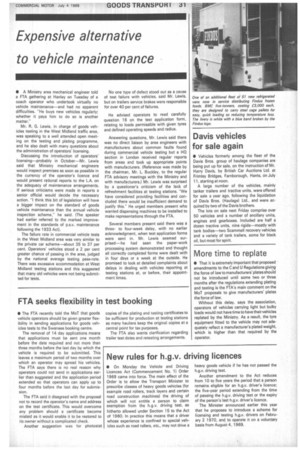Expensive alternative to vehicle maintenance
Page 33

If you've noticed an error in this article please click here to report it so we can fix it.
• A Ministry area mechanical engineer told a FTA gathering at Hanley on Tuesday of a coach operator who undertook virtually no vehicle maintenance—and had no apparent difficulties. He buys new vehicles regularly; whether it pays him to do so is another matter."
Mr. Ft. G. Lewis, in charge of goods vehicles testing in the West Midland traffic area, was speaking to a well attended open meeting on the testing and plating programme, and he also dealt with many questions about the administration of operators' licensing.
Discussing the introduction of operators' licensing probably in October—Mr. Lewis said that Ministry mechanical engineers would inspect premises as soon as possible in the currency of the operator's licence and would present rational reports to the L.A. on the adequacy of maintenance arrangements. If serious criticisms were made in reports a senior official would decide the necessary action. "I think this bit of legislation will have a bigger impact on the standard of goods vehicle maintenance than the annual vehicle inspection scheme," he said. (The speaker had earlier referred to the marked improvement in the standards of p.s.v. maintenance following the 1933 Act).
The failure rate in commercial vehicle tests in the West Midland area was very similar to the private car scheme—about 35 to 37 per cent. Operators' vehicles stood a 2 per cent greater chance of passing in the area, judged by the national average testing pass-rate. There was excessive accommodation at West Midland testing stations and this suggested that many old vehicles were not being submitted for tests. No one type of defect stood out as a cause of test failure with vehicles, said Mr. Lewis, but on trailers service brakes were responsible for over 40 per cent of failures.
He advised operators to read carefully question 16 on the test application form, relating to loads permissible with given tyres and defined operating speeds and radius.
Answering questions, Mr. Lewis said there was no direct liaison by area engineers with manufacturers about common faults found during commercial vehicle testing but a HO section in London received regular reports from areas and took up appropriate points with manufacturers. (Reference was made by the chairman, Mr. L. Buckley, to the regular FTA advisory meetings with the Ministry and with manufacturers.) Mr. Lewis was surprised by a questioner's criticism of the lack of refreshment facilities at testing stations. "We have considered providing facilities and concluded there would be insufficient demand to justify this." He urged members present who wanted dispensing machines to be installed to make representations through the FTA.
Several members present said there was a threeto four-week delay, with no earlier acknowledgment, when test application forms were sent in. Mr. Lewis seemed surprised—he had seen the paper-work processing system demonstrated and thought all correctly completed forms were dealt with in four days or a week at the outside. He promised to look at detailed complaints about delays in dealing with vehicles reporting at testing stations at, or before, their appointment times.




























































































































































